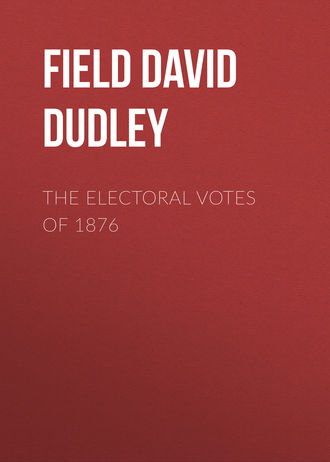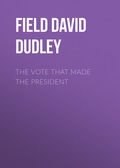
Field David Dudley
The Electoral Votes of 1876
It is impossible, without deranging our system of election, either to reject votes actually cast, out of consideration for the motives with which they were cast, or to add to them the supposed votes which might have been cast. The ballot itself is a standing protest against inquiry into motives. It enjoins and protects the secret of the hand; much more should it enjoin and protect the secret of the heart. And as for adding votes, on the supposition that they might or would have been cast but for untoward circumstances, no plausible reason can be given for it which would not apply to any case of disappointment in the fullness of the vote. A rainy day of election costs one of the parties thousands of ballots. If it happen to rain on that day, why not order a new election in better weather; or, to save that formality, make an estimate of the number who would have attended under a cloudless sky, and add their ballots to one side or the other? The rejection of the votes of a parish can be justified, if justifiable at all, only on the ground that the votes cast do not give the voice of the parish, either because they did not express the real wishes of the voters, or because they would have been overborne by other votes if they could have been cast.
Does not the foregoing reasoning lead to this conclusion, that whether the charges of intimidation in certain counties or parishes of a State be founded in fact or in error, they do not warrant the rejection of the votes actually cast in those counties or parishes; and, furthermore, that they who insist upon such rejection must accept, as a logical conclusion, the rejection, for a like reason, of the votes of the whole State? I submit that such are the inevitable conclusions.
It is insisted, however, that this is an inquiry which cannot be gone into in the present state of the canvass. Certificates have been sent to Washington, purporting to give the result of the election. The question will probably arise, at the meeting of the two Houses, in this manner: Two certificates are required, one signed by the electors, pursuant to the Constitution, certifying their own votes; and the other signed by or under the direction of the Governor of the State, pursuant to act of Congress, certifying the appointment of the electors. Both certificates are sent to the President of the Senate, in one envelope. It may indeed happen that two envelopes come from the same State, each containing two certificates of rival governors, and rival electors. If there is but one envelope, one of the certificates which should be there may be omitted, or may be imperfect. In all these cases, it is manifestly incumbent upon the two Houses to receive or reject, in the exercise of their judgment. But if one envelope only is presented, containing the two certificates, both in due form, and objection is nevertheless made that the certificate of the appointment of electors is false, can the objection be entertained? There are those who affirm that it cannot. They reason in this wise: The States are to appoint the electors, and may therefore certify such as they please. But is not that a non sequitur? The States may appoint whom they please, in such manner as their Legislatures have directed, but an appointment and a certificate are different things. The latter is, at the very best, only evidence of the former. The fact to be determined is the appointment; the certificate is produced as evidence; it may be controvertible or incontrovertible, as the law may have provided, but there is nothing in the nature of a certificate which forbids inquiry into its verity; it is not a revelation from above; it is a paper made by men, fallible always, and sometimes dishonest as well as fallible; and, if honest, often deceived. It is made generally in secret and ex parte, without hearing both sides, without oral testimony, without cross-examination. Of such evidence it may be safely affirmed, that it is never made final and conclusive without positive law to that express effect.
Now, it may be competent for the Legislature of a State, under its own constitution, to determine how far one of its own records shall be conclusive between its own citizens. It may enact, that the certificate of a judge of a court of record, of a sheriff, a county commissioner, a board of tax assessors, or aboard of State canvassers, shall or shall not be open to investigation. There is, however, no act of Congress on the subject of the present inquiry, and we are left to the Constitution itself, with such guides to its true interpretation as are furnished by just analogy and by history. If it can be shown that the certificate was corruptly made, by the perpetration of gross frauds in tampering with the returns, must it nevertheless flaunt its falsehood in the faces of us all, without the possibility of contradiction? A President is to be declared elected for thirty-eight States and forty-two millions of people; the declaration depends upon the voice, we will suppose, of a single State; that voice is uttered by her votes; to learn what those votes are, we are referred to a certificate, and told that we cannot go behind it. In such case, to assert that the remaining thirty-seven States are powerless to inquire into the getting up of this certificate, on the demand of those who offer to prove the fraud of the whole process, is to assert that we are the slaves of fraud, and cannot take our necks from the yoke. I do not believe that such is the law of this land, and I give these reasons for my belief.
In the absence of express enactments to the contrary, any judge may inquire into any fact necessary to his judgment. The point to be adjudged and declared in the present case is, who has received a majority of the electoral votes, that is, of valid electoral votes, not who has received a majority of certificates. A President is to be elected, not by a preponderance of certification, but by a preponderance of voting. The certificate is not the fact to be proved, but evidence of the fact, and one kind of evidence may be overcome by other and stronger evidence, unless some positive law declares that the weaker shall prevail over the stronger, the false over the true. There may, as I have said, be cases where, for the quieting of titles, or the ending of controversies, a record or a certificate is made unanswerable; that is, though it might be truthfully answered, the law will not allow it to be answered. Such cases are exceptional, and the burden of establishing them rests upon him who propounds them. Let him, therefore, who asserts that the certificate of a returning board cannot be answered by any number of living witnesses to the contrary, show that positive law which makes it thus unanswerable. There is certainly nothing in the Constitution of the United States which makes it so, as there is no act of Congress to that effect.
A certificate of a board of returning officers has nothing to liken it to a judicial record of contentions between parties. The proceeding is ex parte; or, if there be parties, the other States of the Union are not represented, however much their rights may be affected; the evidence is in part at least by one-sided affidavits; the judges may be interested and partial. What such a board has about it to inspire confidence or command respect, it is hard to perceive. If there be any presumption in its favor, or in favor of the justice of its judgments, the presumption is as far from indisputable as a disputable presumption can ever be.
To recapitulate, we may formulate the question in this manner: Whom has the State appointed to vote in its behalf for President? The manner of appointment is the vote of the people, for the Legislature has so directed. Who, then, are appointed by the people? To state the question is nearly equivalent to stating what evidence is admissible; for the question is not, who received the certificate, but who received the votes; and any evidence showing what votes were cast and for whom is pertinent and must therefore be admissible, unless excluded by positive law. The law by which this question is to be decided is not State, but Federal. If it were otherwise, the State officers might evade the Constitution altogether, for this ordains that the appointment shall be by the State, and in such manner as its Legislature directs; but if the State certificate is conclusive of the fact, the State authorities may altogether refuse obedience to the constitution and laws, and save themselves from the consequences by certifying that they have obeyed them. And they may in like manner defraud us of our rights, making resistance impossible, by certifying that they have not defrauded. Indeed, they might make shorter work of it, and omit the election altogether, writing the certificate in its stead.



